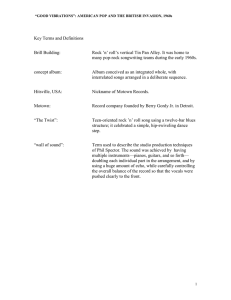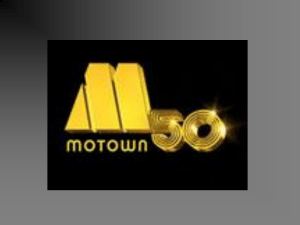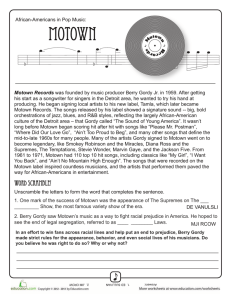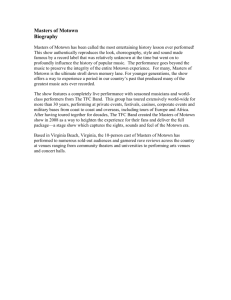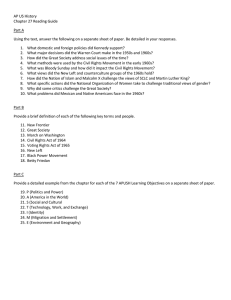Important Names and Bri#113.doc
advertisement
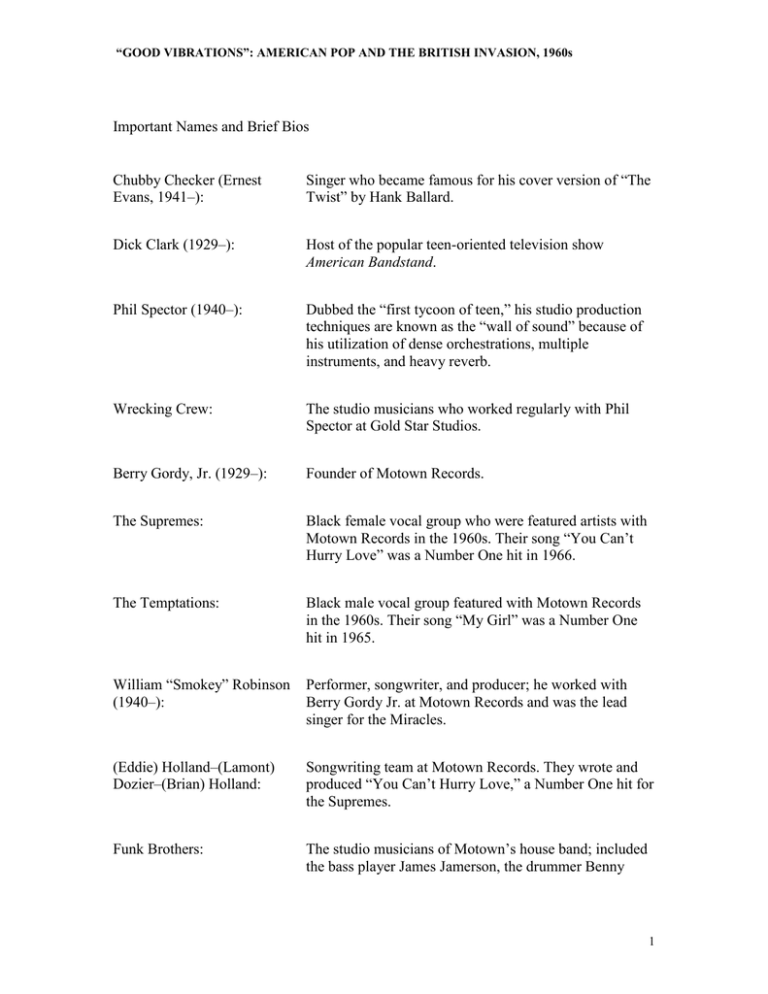
“GOOD VIBRATIONS”: AMERICAN POP AND THE BRITISH INVASION, 1960s Important Names and Brief Bios Chubby Checker (Ernest Evans, 1941–): Singer who became famous for his cover version of “The Twist” by Hank Ballard. Dick Clark (1929–): Host of the popular teen-oriented television show American Bandstand. Phil Spector (1940–): Dubbed the “first tycoon of teen,” his studio production techniques are known as the “wall of sound” because of his utilization of dense orchestrations, multiple instruments, and heavy reverb. Wrecking Crew: The studio musicians who worked regularly with Phil Spector at Gold Star Studios. Berry Gordy, Jr. (1929–): Founder of Motown Records. The Supremes: Black female vocal group who were featured artists with Motown Records in the 1960s. Their song “You Can’t Hurry Love” was a Number One hit in 1966. The Temptations: Black male vocal group featured with Motown Records in the 1960s. Their song “My Girl” was a Number One hit in 1965. William “Smokey” Robinson (1940–): Performer, songwriter, and producer; he worked with Berry Gordy Jr. at Motown Records and was the lead singer for the Miracles. (Eddie) Holland–(Lamont) Dozier–(Brian) Holland: Songwriting team at Motown Records. They wrote and produced “You Can’t Hurry Love,” a Number One hit for the Supremes. Funk Brothers: The studio musicians of Motown’s house band; included the bass player James Jamerson, the drummer Benny 1 “GOOD VIBRATIONS”: AMERICAN POP AND THE BRITISH INVASION, 1960s Benjamin, and the keyboardist Earl Van Dyke. Diana Ross (1944–): The lead singer for the Supremes. After leaving the Supremes in 1970, she became a successful solo artist. Beach Boys: Founded in California in 1961, they popularized the “California sound” in the early 1960s. Their hit songs included “Surfin’ Safari,” “Surfer Girl,” “California Girls,” “Surfin’ USA” and “Good Vibrations.” Brian Wilson (1942–): The leader and guiding spirit of the Beach Boys during their first decade. He wrote and produced many of the Beach Boys’ biggest hits, including “Good Vibrations.” The Beatles: Rock group from Liverpool, England, who dominated American popular music during the mid-1960s and started the “British Invasion.” The band included John Lennon and George Harrison on lead and rhythm guitars and vocals, Paul McCartney on bass and vocals, and Ringo Starr on drums and occasional vocals. The Rolling Stones: A British rock group who cultivated an image as “bad boys” in deliberate contrast to the friendly public image projected by the Beatles. Ramon “Mongo” Santamaria (1917–2003): Cuban-born New York musician who recorded “Watermelon Man,” the biggest hit of the bugalú/Latin soul genre. Ray Barretto (1929–2006): New York–born musician and bandleader of Puerto Rican descent whose recording of “El Watusi” was a major bugalú/Latin soul hit. João Gilberto (1931–): Musician most often credited with initiating bossa nova. Antônio Carlos Jobim (1927– Composed the first recording of the bossa nova genre, a 1994): version of the song “Chega de Saudade.” 2 “GOOD VIBRATIONS”: AMERICAN POP AND THE BRITISH INVASION, 1960s Stan Getz (1927–1991): Californian saxophonist whose album with João Gilberto, Getz/Gilberto, included “The Girl from Ipanema,” the biggest hit of the bossa nova era. Herb Alpert (1935–): Los Angeles–born trumpet player and songwriter. With his band, the Tijuana Brass, placed 10 albums in the Billboard Top Ten between 1965 and 1968. Hits include “The Lonely Bull” and “A Taste of Honey.” 3
